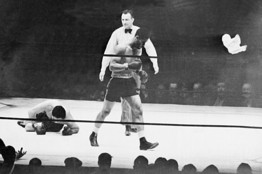A friend recently told me he was resigning from a volunteer organization that they had been involved with. Frustrated by the organization’s unwillingness to adapt and become more user-friendly after months of trying, my friend said he was “throwing in the towel.”
Origin
Throwing In the Towel is a term from boxing. Back in the day, when a boxer, while still on his feet, was nevertheless hurt and/or clearly beaten, the boxer’s manager would end the fight by throwing a towel into the ring, so that his boxer would avoid further injury and so would live to fight another day. I saw it happen (on TV) once decades ago but not recently, although I don’t watch much boxing

Everyone
Everyone has assuredly encountered a situation where you have thought about quitting. Maybe it was on your 2nd day of Kindergarten, or maybe it was your prior job or prior relationship. Maybe you are thinking about quitting something or “throwing in the towel” on an investment right now. It is natural and probably healthy to do so.
How To Decide?
The basis upon which you decide to quit something can be either rational or emotional, and probably will be both – at least there should be some rational component to the decision to quit. For investing, the more rational the decision, and the more emotions are not part of the decision, the better. The best thing is to be completely “rules-based” on your decision to quit, or to sell an investment. For instance, I try to sell an investment if its price falls 7% or more from the price that I paid for it. The extenuating circumstances don’t matter. Rules are rules. Another rule is that I sell when the investment has risen to the “target price” that I set when I bought the investment. This is the “pigs get fat but hogs get slaughtered” rule.
Kenny Rogers
There is also the concept of understanding when the odds are in your favor or against you. This is the “Know When to Hold’Em, Know When to Fold’Em”, Kenny Rogers lyric rule. Doesn’t matter what you paid for the investment, or whether you have tripped a rules-based circuit breaker. If the odds are no longer in your favor, Sell right then and there. How do you know if and when the odds are in your favor? That is a lifelong quest.
Opportunity Cost
Another factor to consider in deciding to quit: What is the cost of staying in an investment or any endeavor relative to the opportunity cost of allocating your money or your time to a different investment or endeavor? Will you earn more money or gain more satisfaction by moving on to something different? Or will the reward from hard-fought, long term commitment earned by staying in be just that much sweeter? Only you can make that decision, but the concept of Opportunity Cost can at least provide you with a framework for how to make that decision, and inject at least some rationality into the process.
IMO
At a higher level, you can never really “throw in the towel” on your finances any more than you can “throw in the towel” on your life. All you can do is look at financial planning rationally with your goals and/or wants in mind at all times. You can exit an individual investment, but you still have to do something with that money after the exit, much as life goes on after you quit your job. From that standpoint, “throwing in the towel” is really a short-term concept within the continuum of your life. Tomorrow will be another day, so try as best as you can to be as rational as you can, and rely on rules that you set at the outset.
